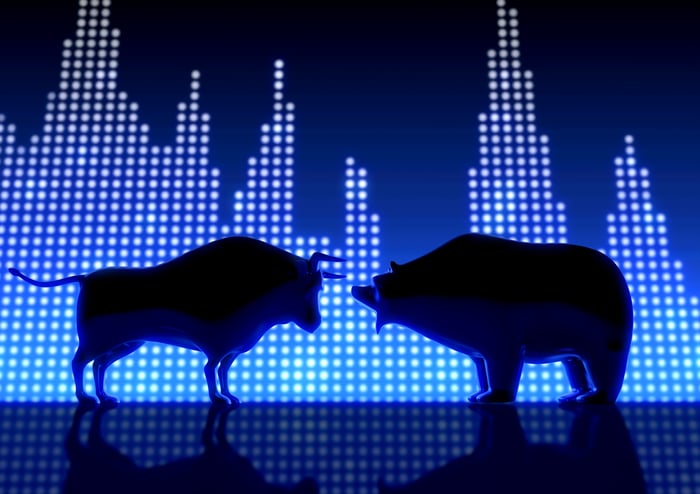It's official.
With the 3.75% decline on Thursday, Feb. 8, 2018, the stock market entered correction territory, with the S&P 500 falling more than 10% from the all-time highs reached in late January. While this doesn't mean an end to the bull market's historic run, there is a whiff of uncertainty in the air, and volatility reigns supreme, making it a perfect time to pinpoint stocks that tend to do well during both rising and falling markets.
With that in mind, we asked three Motley Fool investors to identify income investments that could prosper regardless of the prevailing market conditions. They provided compelling arguments for Walmart Inc. (WMT -2.35%), Duke Energy Corporation (DUK 0.37%), and McDonald's Corporation (MCD -0.37%).

These companies succeed in good times or bad. Image source: Getty Images.
Danny Vena (Walmart): Investors looking to succeed over the long term tend to fortify their holdings with companies that thrive in both good times and bad. Many of these businesses provide a product or service that is needed come rain or shine. That's a pretty fair assessment when it comes to Walmart, providing a haven for shoppers day in and day out.
Even during the stock market plunge that accompanied the Great Recession, Walmart was able to outperform the S&P 500, gaining 10%, compared to the market's 56% plummet.
Walmart benefits from the economies of scale that come from being the world's largest retailer. During the trailing 12 months, the company generated revenue of $495 billion and operating income of $22.18 billion. During that same period, cash flow from operations topped $28.81 billion, and the company returned $14.87 billion to shareholders in dividends and share repurchases. These shareholder-friendly practices have resulted in a share count that has declined by over 20% in the last decade.
The company's forays into e-commerce are bearing fruit. In the most recent quarter, online sales jumped 50% year over year, which marks the third sequential quarter of year-over-year growth exceeding 50%.
Walmart is one of the rarefied breed that has continued to pay dividends through thick and thin. The company is a Dividend Aristocrat, with 44 years of consecutive annual increases. Its dividend currently yields 2% while paying out only 53% of its profits, leaving plenty of opportunity for increases -- the next of which could be announced as early as later this month.
Walmart is one of those uncommon companies that can slay the bear while embracing the bull.
A cornerstone investment
Reuben Gregg Brewer (Duke Energy Corp): Duke Energy is one of the largest utilities in the United States. It's really a pretty boring business, with over 90% of its revenues derived from regulated operations. This is good and bad. On the bad side, Duke has to get approval from the government to increase customer prices. On the good side, if rate hikes are approved, they lock in decent returns.

Consumers always need utilities. Image source: Getty Images.
The key to getting rate hikes approved is spending on things like new electric plants and storm hardening transmission systems. Regulators usually deem these investments important to ensure adequate supply of energy and reliable delivery. Duke's current plans include roughly $36 billion in capital spending between 2017 and 2021. Management believes that spending will drive 5% earnings and dividend growth over the span. The best part is that these operating results aren't dependent on the stock market's ups and downs.
This brings us to the really "exciting" thing here: beta. Beta is a measure of volatility relative to the broader market. Duke's beta is 0.12, suggesting that it's roughly 12% as volatile as S&P 500 Index. Good market, bad market -- doesn't really matter, Duke keeps on chugging along, doing its own boring thing...like paying a dividend for more than 90 consecutive years!
Right now, you can own Duke with a robust 4.6% yield thanks partly to investor concerns that rising interest rates will make stagnant bond payments more desirable than a utility that can increase its dividends over time. Duke may never excite you, but it can provide a solid foundation for your investment portfolio, a lofty yield, and dividend growth set to outpace inflation.
Don't worry about your McDividend
Tim Green (McDonald's): A recession can wreak havoc on the restaurant industry as consumers pull back their spending. But McDonald's focus on providing value to its customers insulates it, at least to a degree, from the ups and downs of the market and the economy.
While McDonald's has made some mistakes over the past few years, like pushing healthy wraps that were later pulled from the menu, the company seems to now be back on track. The introduction of all-day breakfast was a big winner, and its new value menu is driving traffic at a time when many restaurant chains are struggling. Global comparable sales jumped 5.5% during the fourth quarter, with positive guest counts in every segment.

Image source: McDonald's.
Because McDonald's results will likely hold up if the market tanks, the dividend should be sustainable in a wide variety of conditions. The stock yields about 2.5% based on the latest payment, and about 63% of annual earnings go toward the dividend. That leaves a decent cushion to protect the dividend if earnings slump.
McDonald's stock price may decline if the market takes a turn, but that dividend should keep coming in quarter after quarter.






